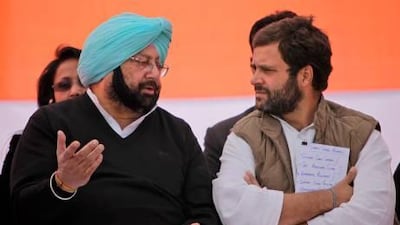NEW DELHI // With 800,000 unemployed college graduates, a stagnant economy and rampant corruption, Punjab's state election tomorrow could do irreparable harm to India's government.
Punjab is one of five of India's 28 states holding elections in the next month that may well reshape the balance of power in the upper house of parliament.
While the polls will mostly be played out on local issues, they could indicate how unpopular the ruling Congress Party has become after a year of high-profile scandals, a populist anti-corruption movement and failure to push ahead with reforms.
Punjab, one of India's wealthiest states and its major wheat producer, is a key battleground for the Congress party, which hopes to retake control of the state.
India's prime minister, Manmohan Singh, is a Sikh from Punjab, and analysts say it is essential to the credibility of his government that his party can win back the state.
"Punjab is a face-saving state for the Congress," said Rasheed Kidwai, the author of a book published in 2011 that examined the inner workings of the Congress party. "If they cannot win here, it will be very hard for them to push through reforms in the coming months."
The members of India's upper house, the Rajya Sabha, are indirectly elected by members of the state legislatures. If Congress wins in Punjab, it would provide the momentum it needs to push through legislation upon which the government has staked its reputation.
The winter session of the Indian parliament was defined by constant gridlock. Intransigence from the opposition made it nearly impossible for the government to operate and parliament was adjourned early more than a half dozen times.
"A Congress win in Punjab would break the deadlock in parliament," added Mr Kidwai.
A win in Punjab would also signal a victory over one of the government's biggest gadflies, the anti-corruption activist Anna Hazare.
In April, Mr Hazare galvanised the anger of ordinary Indians against corruption into a protest movement against the Singh government. A series of high-profile corruption cases led many Indians, including Mr Hazare, to call Mr Singh's government the most corrupt in the history of a country that last year was ranked 95th out of 178 countries in Transparency International's Corruption Perceptions Index.
Mr Hazare has promised to orchestrate Congress's defeat in Punjab.
The main national party of opposition, the Bharatiya Janata Party (BJP), also has much at stake in Punjab. The party governs the state in coalition with the Shiromani Akali Dal party, a mainly Sikh party.
The BJP gambled that the gridlock they created in the recent session of parliament would prove popular with the people. The Punjab election could show whether they were right.
"Here is one state that reeks of corruption and it is a very big issue," said Mr Kidwai. He believes that the outcome of the elections in Punjab will determine whether the people care more about passing bills or ridding the country of corruption."
Hartosh Singh Bal, the political editor of Open, a current affairs magazine in India, said most of the candidates in Punjab have criminal cases pending against them.
"Around 70 per cent of them have declared assets of over 10 million rupees (Dh733,000)".
Many Punjabis believe these are ill-gotten gains.
But Mr Bal believes corruption is only a tangential issue in the state. The real problem is rising unemployment and economic stagnation.
Punjab was a large beneficiary of India's Green Revolution in the 1950s when the government provided massive subsidies to farmers in the state.
But the state is approaching the upper limit of the amount of farming that can be sustained by the underground reservoirs.
Mr Bal predicts that 20 to 30 per cent of the state is headed towards an agricultural disaster if farms continue to use groundwater at the current rate. In 15 to 20 years, he said, Punjab will have to import water to sustain its farming industry.
That is driving unemployment in the state, particularly among young college graduates.
There are roughly 800,000 unemployed recent college graduates in the state - a figure that has risen steadily over the past decade.
The stagnation of the state's traditional economy and the rising unemployment is driving a new brand of politics in the state.
Both the ruling BJP-Akali Dal coalition and its Congress opponents are talking about the need to diversify the economy, said Dr Pramod Kumar, a social scientist at the Institute for development and communication in Punjab.
"Now there is an emphasis on infrastructure building - from airports and roads to building a power surplus," he said.
It may be too late for the BJP and Akali Dal party. The Akali Dal party is torn from within. The current head of the party, Sukhbir Singh Badal, is the son of Parkash Singh Badal, who is serving his fourth term as chief minister of the state. "Party supporters are uncomfortable with his ascension, seeing it as a form of dynastic rule," explained Mr Bal. Handing power from father to son is common in Indian politics, but not in the Akali Dal. "This has never happened before, this is something they have fought against."
For its part, the BJP is struggling to overcome its perceived complicity in the ills of the state. Despite being a minority party, the BJP is expected, as India's second largest political party, to have clout in Punjab, explained Mr Dal. It has failed to do so, and has been equally tarred by the perceived rampant corruption in the state. All five of the party's ministers in the state resigned in May over allegations of graft.
Ultimately, the BJP and Akali Dal may simply fall victim to the whims of the Punjabi voters. Punjabi voters are known for voting against incumbents, and this election may be no exception. "People will vote against a candidate if they're sick of them," said Mr Bal.
Follow
The National
on
& Surya Bhattacharya on

